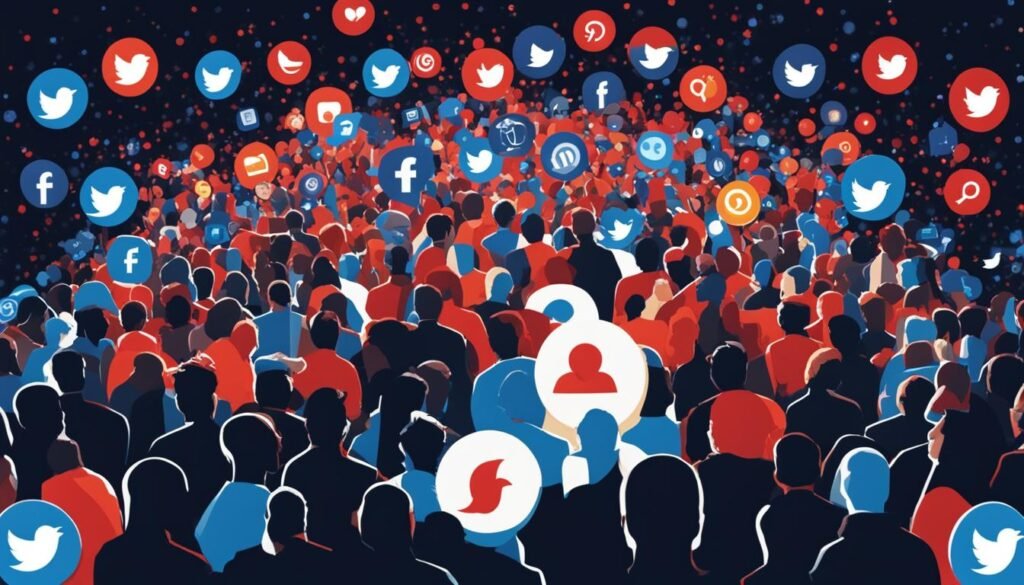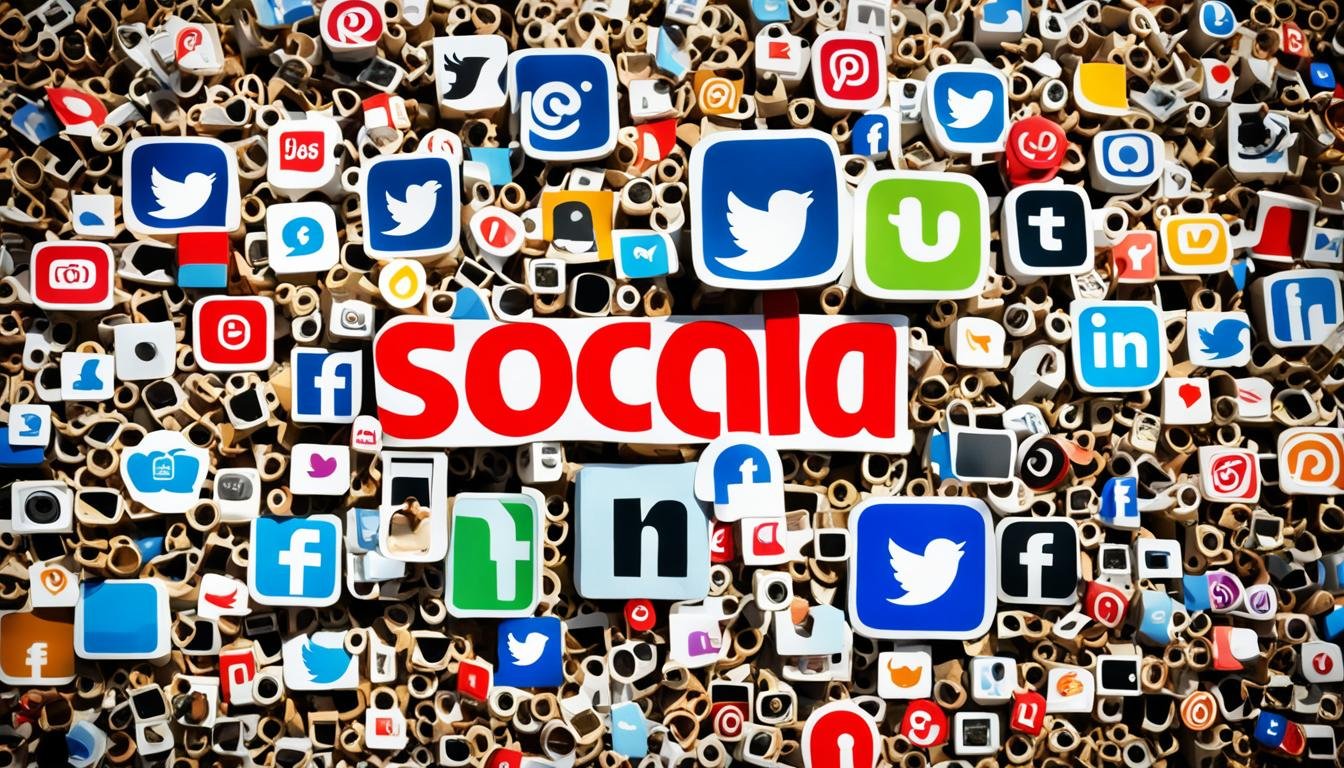Social Media Today has become an integral part of our daily lives in the digital age, greatly influencing the way we connect, interact, and conduct business. Its impact is far-reaching, revolutionizing communication, transforming media consumption habits, and shaping various aspects of society.
From the early days of MySpace and Facebook to the current dominance of platforms like Instagram, Twitter, and TikTok, social media has evolved and expanded at an unprecedented pace, captivating billions of users worldwide. Its widespread adoption and usage have given rise to a new era of connectivity, enabling individuals, businesses, and communities to engage and thrive in an increasingly digital world.
Social media’s influence extends beyond personal interactions, as it has become a powerful tool for businesses to connect with customers, promote their products and services, and build brand awareness. Moreover, it has given rise to the democratization of information, allowing anyone to become a citizen journalist and share news with the world in real-time.
However, the impact of social media goes beyond its positive aspects. It has also given rise to challenges such as the spread of misinformation, cyberbullying, and the erosion of face-to-face interactions. As society navigates this dynamic landscape, it is crucial to understand the implications of social media and harness its potential while addressing its drawbacks.
Key Takeaways: Social Media Today
- Social media has revolutionized communication and media consumption in the digital age.
- It has transformed the way individuals and businesses connect, interact, and conduct business.
- Social media allows anyone to become a citizen journalist, democratizing the spread of information.
- Challenges include the spread of misinformation, cyberbullying, and the potential displacement of face-to-face interactions.
- Understanding the implications of social media is crucial for navigating its influence in society.
The Role of Social Media in Democracy
Social media has emerged as a powerful force in shaping the democratic landscape. With its ability to connect individuals, amplify voices, and disseminate information, social media platforms play a significant role in influencing politics and democratic processes.
According to a survey conducted across 19 countries, a majority of people recognize the positive impact of social media on democracy. However, attitudes toward social media’s role in democracy vary by country. The highest sentiment is observed in Singapore, where 82% of respondents perceive social media as beneficial for democracy. On the other hand, the United States exhibits the lowest sentiment, with only 47% of respondents viewing social media positively for democracy.
Belief in the influence of the political system also plays a crucial role in shaping attitudes toward social media and democracy. Individuals who have confidence in their political system are more likely to view social media as a positive force in democracy.
However, the spread of misinformation online poses a significant challenge to the positive perception of social media’s impact on politics. Across the surveyed countries, the spread of false information is seen as a notable threat. Respondents who perceive the spread of misinformation as a major threat are less likely to view social media as beneficial for democracy.
Age demographics also contribute to the diverse perspectives on social media and democracy. In some countries, older adults are less likely to view social media positively for democracy compared to younger generations.
The Impact of Social Media on Politics
Social media platforms have disrupted traditional communication channels and have become fertile grounds for political discourse. They provide a space for politicians, activists, and citizens to engage in meaningful conversations, mobilize support, and rally for social causes.
“Social media has amplified the voices of marginalized groups and facilitated political mobilization in unprecedented ways.”
However, the democratizing effect of social media in politics is not without its challenges. The spread of hate speech, the rapid dissemination of rumors, and the manipulation of information have raised concerns regarding the reliability and integrity of political conversations on social media.
The Spread of Misinformation
The spread of misinformation presents a significant obstacle to the positive impact of social media on democracy. False information can shape public opinion, influence elections, and undermine trust in democratic institutions.
In an increasingly polarized digital landscape, it is essential to combat the spread of misinformation effectively. Government regulations, fact-checking initiatives, and media literacy programs are among the strategies being employed to address this complex issue.
| Country | Percentage of People View Social Media Positively for Democracy |
|---|---|
| Singapore | 82% |
| Germany | 73% |
| Mexico | 71% |
| South Korea | 65% |
| United States | 47% |
Table: Percentage of People Viewing Social Media Positively for Democracy in Select Countries
As societies continue to grapple with the influence of social media on democracy, it is crucial to strike a balance between leveraging the positive aspects of these platforms while mitigating the negative consequences. By fostering transparency, promoting media literacy, and encouraging responsible use, social media can continue to foster democratic discourse and citizen participation in shaping political landscapes.
The Impact of Technological Connectivity

Technological connectivity, including social media, has had a significant impact on society. It has transformed the way people access information, stay connected, and interact with one another. While technological advancements have brought many benefits, they have also brought about new challenges.
One of the major concerns is the spread of false information online. With the rise of social media platforms, anyone can easily share information, but not all of it is accurate or reliable. The spread of misinformation has become a global issue, with people being exposed to false narratives, conspiracy theories, and rumors.
“The spread of misinformation is one of the most pressing challenges we face in the digital age.”
A survey conducted across several countries revealed that a median of 70% of respondents consider the spread of false information a significant threat. This shows the widespread recognition of the problem and the need for immediate action to address it.
Younger people, who are more likely to use social media, tend to be more aware of the potential for information manipulation. They understand that false information can be easily propagated and influence public opinion. Additionally, individuals with higher education levels often express concern about information manipulation, as they are more critical and discerning in evaluating the credibility of information they consume.
To combat the spread of false information, several initiatives have been implemented. Social media platforms have introduced fact-checking programs and algorithms to flag and reduce the visibility of misinformation. Organizations and individuals have also taken on the responsibility to verify information before sharing it and promote media literacy to educate others on critical thinking and information verification.
The Role of Digital Literacy
Digital literacy plays a crucial role in addressing the challenges of technological connectivity. It involves the knowledge and skills required to navigate and evaluate information online. By promoting digital literacy, individuals become better equipped to distinguish between credible and false information, reducing the chances of being manipulated by misinformation.
Furthermore, education systems need to place a greater emphasis on teaching critical thinking and media literacy skills. By incorporating these skills into the curriculum, students will develop the capacity to critically analyze information, identify biases, and question the authenticity of online content.
The Impact of Technological Connectivity
| Impact | Explanation |
|---|---|
| Access to Information | Technological connectivity has made it easier for people to access a vast amount of information from various sources. |
| Spread of False Information | The ease of sharing information has also led to the rapid spread of false information and rumors. |
| Information Manipulation | Technological connectivity has made individuals more susceptible to manipulation through false information. |
| Efficient Communication | Social media platforms have facilitated faster and more efficient communication among individuals and communities. |
| Social Impact | The impact of technological connectivity on society is complex, with both positive and negative consequences. |
Social Media and Relationships

Contrary to common belief, social media is not replacing face-to-face interaction. Research suggests that abstaining from social media does not result in more time spent socializing with close relationships. Instead, the impact of social media on relationships is complex and requires further exploration.
Teens, in particular, may spend less time on in-person social interactions due to restrictive parenting rather than social media use. While social media may be a contributing factor, it is important to consider other influences on social displacement.
However, it is worth noting that increased social media use has been associated with more feelings of loneliness among adolescents. This raises concerns about the potential negative impact of excessive social media consumption on mental well-being and social connection.
Further research is needed to understand the intricate dynamics between social media use and relationships. By delving deeper into this topic, we can gain valuable insights into the role of social media in shaping interpersonal connections.
The Impact of Social Media on Face-to-Face Interaction
Many people express concerns about the potential displacement of face-to-face interaction due to social media. However, studies suggest that the relationship between social media and face-to-face interaction is more nuanced.
Social media has created new opportunities for connection and communication, allowing individuals to maintain relationships even when physical proximity is not possible. It can be a valuable tool for staying in touch with loved ones, especially in long-distance relationships or during periods of social distancing.
At the same time, excessive social media use can lead to a decrease in the quality and frequency of face-to-face interactions. It is important for individuals to find a balance between online and offline social engagement to maintain healthy relationships.
The Complex Dynamics of Social Media and Relationships
Social media has both positive and negative implications for relationships. On one hand, it provides a platform for expressing love and support, sharing milestones, and staying connected with friends and family. On the other hand, it can also lead to feelings of envy, comparison, and isolation.
Relationships thrive on mutual trust, understanding, and quality time spent together. While social media can facilitate communication, it is crucial to remember that it cannot replace the depth and intimacy of face-to-face interactions.
It is essential for individuals to be mindful of their social media usage and prioritize meaningful offline connections. By actively nurturing real-world relationships alongside virtual ones, we can maintain healthier and more fulfilling social lives.
Building Strong Relationships in the Digital Age
Although social media has its limitations, it can still be a valuable tool for building and strengthening relationships. By leveraging social media effectively, individuals can:
- Maintain connections with loved ones who are geographically distant
- Discover shared interests and connect with like-minded individuals
- Utilize group features and online communities to foster a sense of belonging
- Express support and celebrate milestones together
By striking a balance between online and offline interactions and using social media as a complement to face-to-face communication, individuals can navigate the digital landscape and maintain meaningful relationships in the digital age.
| Positive Aspects of Social Media and Relationships | Negative Aspects of Social Media and Relationships |
|---|---|
| Facilitates long-distance communication | May lead to feelings of envy and comparison |
| Creates opportunities for shared interests and communities | Can contribute to a decrease in the quality of face-to-face interactions |
| Allows for instantaneous communication and updates | May lead to increased loneliness and social isolation |
| Provides a platform for support and celebration | Can lead to the spread of misinformation and rumors |
Social Media and Teens

Social media has become an integral part of teenagers’ lives, with a majority using it multiple times an hour. It has transformed the way they communicate, connect, and express themselves, offering numerous opportunities for personal growth and creativity. However, the impact of social media on teenagers’ well-being is a subject of concern.
“Social media is both a blessing and a curse for teenagers. It provides a platform to expand their social networks, connect with friends, and discover new interests. At the same time, it exposes them to cyberbullying, inappropriate content, and unrealistic beauty standards,” says Dr. Sarah Johnson, adolescent psychologist.
The constant exposure to curated versions of others’ lives on social media can lead to negative comparisons and feelings of inadequacy among teenagers. This can subsequently impact their self-esteem and mental health. Research suggests a link between excessive social media use and symptoms of anxiety and depression in teens.
Cyberbullying is another significant concern associated with social media use among teenagers. Online harassment, hate speech, and the spread of rumors can have a devastating impact on their psychological well-being. According to a study conducted by Pew Research Center, 59% of U.S. teens reported experiencing cyberbullying in some form.
While the role of social media in cognitive development is still being explored, it is evident that it influences offline developmental concerns such as identity exploration. Social media platforms allow teenagers to experiment with different aspects of their identity, connect with peers who share similar interests, and express their individuality.
However, the benefits and harms of social media use among teens are yet to be fully understood. It is crucial for parents, educators, and policymakers to facilitate healthy social media habits while addressing the risks. Supporting digital literacy, creating safe online environments, and open communication are essential in navigating the complex intersection of social media and teenagers’ well-being.
The Positive and Negative Impacts of Social Media

Social media has had a profound impact on society, bringing about both positive and negative changes. One of the positive effects of social media is the democratization of information, allowing anyone to become a citizen journalist and share news with the world. This has significantly transformed the media landscape, giving a voice to individuals and communities who were previously marginalized.
Furthermore, social media has revolutionized marketing and advertising strategies, enabling businesses to reach their target audience more effectively. With the ability to tailor content and advertisements based on user preferences and demographics, companies can engage with their customers in a more personalized and meaningful way.
However, along with its positive contributions, social media has also facilitated the spread of misinformation and hate speech. The ease of sharing information on social platforms has given rise to fake news and conspiracy theories, posing a threat to society’s well-being. Moreover, the anonymity provided by social media can amplify negative behaviors, leading to cyberbullying, harassment, and the dissemination of harmful content.
The negative effects of social media extend beyond the digital realm and have significant implications for mental health. Studies have shown a correlation between excessive social media use and feelings of anxiety, depression, and loneliness, particularly among young people. The constant comparison to idealized representations on social media can contribute to low self-esteem and a distorted perception of reality.
“Social media has democratized information sharing, allowing individuals from all walks of life to have a voice and share their stories with a global audience.”
It is crucial to strike a balance between the positive and negative impacts of social media. While it has brought about numerous benefits, such as the democratization of information and enhanced connectivity, it is essential to address the challenges it poses. Measures must be taken to combat the spread of misinformation, promote digital literacy, and foster a safe and inclusive online environment.
Social Media’s Influence on Politics and Social Issues

Social media has emerged as a powerful platform for political activism, with movements like Black Lives Matter and #MeToo gaining widespread support and amplification through social media campaigns. These movements have harnessed the reach and virality of social media to raise awareness, spark conversations, and drive social change.
Activism on social media has proven to be a powerful tool in mobilizing individuals and bringing attention to pressing social and political issues. Through hashtags, shareable content, and online organizing, social media has facilitated the rapid spread of information and galvanized communities to take action.
“Social media has provided marginalized communities with a voice and a platform to challenge the status quo, demand justice, and advocate for change in a way that was unprecedented before.” – Michelle Simmons, Activist and Social Media Strategist
However, the influence of social media on politics and social issues is not without its challenges. The spread of hate speech and the radicalization of extremist groups have also found fertile ground on social media platforms. The viral nature of content on social media can inadvertently amplify misinformation and incendiary rhetoric, fueling polarization and further dividing society.
The fast-paced and often anonymous nature of social media can contribute to the rapid dissemination of harmful or false information, creating an environment where rumors and conspiracy theories can thrive. The spread of hate speech poses significant risks to the social fabric, exacerbating societal divisions and promoting intolerance.
It is essential for individuals, social media platforms, and policymakers to be vigilant in monitoring and addressing the spread of hate speech and extremist ideologies online. Striking a balance between freedom of expression and responsible online behavior is crucial to ensure the integrity of public discourse and the promotion of a more inclusive society.
Examples of Social Media’s Impact on Politics and Social Issues
Social media has played a pivotal role in shaping political landscapes and social movements around the world. Here are a few notable examples:
- The Arab Spring: The Arab Spring revolutions in various countries across the Middle East and North Africa in 2010-2012 were fueled, in part, by the power of social media. Platforms like Facebook and Twitter served as organizing tools for activists to coordinate protests, share information, and challenge authoritarian regimes.
- The #BlackLivesMatter Movement: Black Lives Matter, a movement advocating against anti-Black racism and police brutality, gained significant momentum through social media. The hashtag #BlackLivesMatter became a rallying cry, sparking widespread discussions, protests, and calls for systemic change.
- The #MeToo Movement: The #MeToo movement, which initially gained traction on social media in 2017, brought attention to the widespread prevalence of sexual harassment and assault. Survivors shared their stories using the hashtag, creating a global conversation and demanding accountability.
While social media’s influence on politics and social issues is complex and multifaceted, it cannot be denied that it has reshaped the landscape of public discourse and activism. As society continues to grapple with the challenges and opportunities presented by social media, it is crucial to foster responsible and inclusive online communities that promote constructive dialogue and positive social change.
The Future of Social Media
As social media continues to evolve, it is crucial to recognize its ever-changing landscape. The future of social media holds immense potential for individuals, businesses, and society as a whole.
One of the key challenges that need to be addressed is mitigating the negative effects of social media. The spread of misinformation and its impact on mental health are pressing issues that require ongoing efforts. By implementing stringent policies, fact-checking mechanisms, and promoting digital literacy, we can work towards creating a safer and more reliable social media environment.
Technological advancements will play a significant role in shaping the future of social media. AI tools and generative AI are expected to revolutionize content creation, personalization, and user experience. These advancements will enhance the way we engage with social media platforms, offering tailored and meaningful content that resonates with individual interests and preferences.
“The future of social media lies in leveraging technology to foster meaningful connections and promote positive experiences.”
The evolving landscape of social media will also have a profound impact on how businesses market their products and engage with their target audience. The rise of influencer marketing, interactive advertising formats, and immersive experiences will transform traditional marketing strategies.
Furthermore, the future of social media will see an increased focus on authenticity, transparency, and privacy. Users’ concerns over data privacy and security will drive the development of stricter regulations and more user-centric platforms.
To stay ahead in the rapidly evolving social media landscape, it is essential to study and understand these developments. Businesses and individuals alike must adapt their strategies to harness the full potential of social media while addressing its challenges.
In conclusion, the future of social media is both exciting and challenging. By mitigating negative effects, embracing technological innovations, and prioritizing authenticity and privacy, we can shape social media into a powerful tool for communication, connection, and positive change in the years to come.
Utilizing social media is a fundamental aspect of digital marketing, keeping up with the latest social media trends and news across various social media sites. With the rise of social commerce and new features like generative AI and short-form video content, different social media platforms have become influential in brand awareness and user engagement.
In October 2023, many social media platforms, including the fastest-growing ones like TikTok, have incorporated generative AI tools, attracting millions of users and enabling the creation of user-generated content. Platforms such as Facebook, Instagram, and YouTube continue to dominate with monthly active users surpassing millions.
Mark Zuckerberg’s innovative approach, including features like Instagram Reels and YouTube Shorts, has led to significant growth. As of June 2023, the use of social media advertising, influencer marketing, and chatbots has become integral to social media marketing strategies.
The introduction of a new search feature and Twitter alternative has also shaped the landscape, allowing users to share news stories and trending topics. Privacy policy and user engagement are critical considerations, and according to Statista, the U.S. is a significant market for these platforms. Keeping up with the evolving social media landscape is crucial for businesses looking to attract new customers and promote their brand or product across social media platforms.
Also Read : Boost Your Brand With A Social Media Strategist
Conclusion
Social media has had a profound impact on society, permeating every aspect of our lives. It has revolutionized communication, enabling people to connect with each other on a global scale. The transformation of media consumption habits has further amplified the influence of social media, with users now relying on platforms like Facebook, Twitter, and Instagram for news and entertainment.
Moreover, social media has played a pivotal role in shaping politics and social issues. Movements like #BlackLivesMatter and #MeToo have gained significant momentum through social media campaigns, bringing about important conversations and driving change. However, the flip side of this influence is the spread of hate speech and the radicalization of extremist groups, highlighting the need for responsible usage.
Looking ahead, the future of social media holds both opportunities and challenges. It is crucial to navigate its implications carefully, harnessing its potential while addressing its drawbacks. As technology continues to advance, new features and AI tools are likely to shape the landscape of social media, offering innovative ways to engage with audiences. Mitigating the negative effects, such as the spread of misinformation and the impact on mental health, will be crucial to ensure a positive and inclusive digital environment going forward.
In conclusion, social media has profoundly transformed our society, leaving an indelible impact on how we communicate, consume media, and engage with social issues. It is imperative that we recognize the role of social media in society and take proactive steps to harness its potential for positive change while mitigating its challenges. By doing so, we can navigate the evolving landscape of social media and build a more informed, connected, and responsible digital future.
FAQs
Q: What are the latest social media trends?
A: Some of the latest social media trends include short-form video content, social commerce, influencer marketing, and user-generated content.
Q: How has TikTok impacted social media platforms?
A: TikTok has significantly influenced social media with its short-form, engaging video content, and has become a popular platform for users and marketers alike.
Q: What are the projected trends for social media in 2023 and 2024?
A: In 2023 and 2024, social media is expected to continue evolving with new AI integrations, content creation tools, and advancements in social commerce.
Q: How can social media impact marketing strategies?
A: Social media platforms provide opportunities for targeted marketing, customer engagement, influencer partnerships, and content promotion, impacting marketing strategies significantly.
Q: What are the top social media platforms today?
A: The top social media platforms include Facebook, Instagram, TikTok, LinkedIn, Snapchat, Twitter (now known as Meta), Pinterest, WhatsApp, and Reddit.
Q: What is the significance of user-generated content in social media?
A: User-generated content plays a crucial role in engaging the audience, building authenticity, and promoting brand advocacy across social media platforms.
Q: How can businesses effectively use social media for promotion?
A: Businesses can leverage social media for brand promotion, customer engagement, lead generation, and driving website traffic through targeted content and advertising strategies.
Q: What are the key differences between social media marketing and traditional marketing?
A: Social media marketing allows for more personalized, interactive, and targeted approaches compared to traditional marketing, catering to specific demographics and interests.
Q: What impact does social media have on customer engagement?
A: Social media facilitates direct interaction, feedback sharing, and real-time communication, enhancing customer engagement and brand-consumer relationships.
Q: How does influencer marketing benefit businesses on social media?
A: Influencer marketing enables businesses to reach a wider audience, build credibility, and create authentic connections with consumers through influencer partnerships and sponsored content.
Source Links
- https://www.pewresearch.org/global/2022/12/06/views-of-social-media-and-its-impacts-on-society-in-advanced-economies-2022/
- https://www.linkedin.com/pulse/impact-social-media-society-krishna-giri
- https://www.apa.org/members/content/social-media-research





